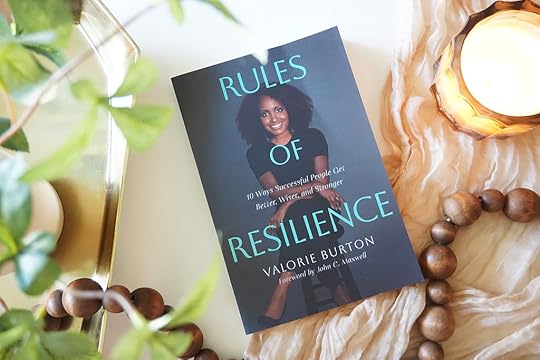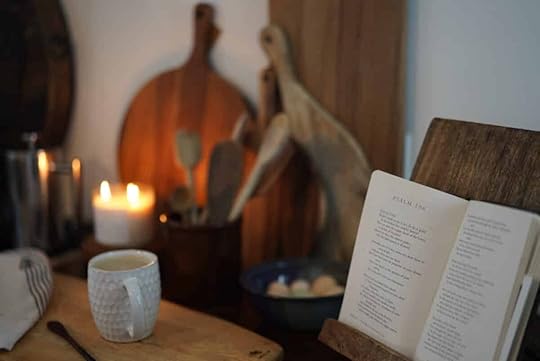Don’t Pretend, Don’t Defend: How Authenticity Builds Resilience
I know how it feels — the sting of messing up, of letting others down, of watching something unravel you never meant to tangle. I’ve wanted to hide, to fix it quietly, to move on fast. Valorie Burton, CEO and personal coach, reminds me of a deeper way forward: what if we didn’t rush past our mistakes, but walked through them with honesty and grace? Valorie has learned that when we stop covering up our struggles and start growing through them, something beautiful happens — we find the kind of resilience that truly lasts. It’s a joy to welcome Valorie to the farm’s table today…
Guest Post by Valorie Burton
“Don’t think you are better than you really are. Be honest in your evaluation of yourselves, measuring yourselves by the faith God has given us.” Romans 12:3
When I was sixteen, I experienced a series of three small driving accidents about nine months after I’d barely passed my driver’s test.
My car was a $400 “snow car” my dad had bought from a coworker. If you grew up or live in a place where it snows a lot, it’s nice to have a car you don’t mind getting dinged in the snow. “Flo,” as I named her for her fluorescent yellow color, was a Volkswagen Rabbit stick shift with faux sheepskin seat covers.
The first incident occurred as I was giving a friend’s younger brother a ride home from school.
I slid across a sheet of ice while rounding a corner, hitting the curb with a loud thud, and landing in the crunchy, snow-covered grass. I managed to slowly drive us back to the school as one of the tires made a persistent and rhythmic clunking noise with every rotation. Turns out I’d bent the axle. A mechanic fixed it, or so we thought.
Eight months later, the engine mount broke. Apparently, I’d also cracked that when I hit the curb, and it eventually gave way to the engine’s weight.









On another occasion, I bumped the front of the garage while parking, creating a dent in the drywall and a crack in the cement baseboard. I hoped no one would notice, and when they did, I pretended I had no idea how it happened.
The third mishap was the most egregious, though.
One day after school, I backed out of the garage and down our short driveway, which was lined with small pencil shrubs. For a reason I can only attribute to my novice driving skills, I didn’t back straight down the driveway.
Nope. I curved a little to the left and split two small bushes right down the middle!
I am embarrassed to admit that not only did I pretend I didn’t do it, but I also made up an elaborate story to defend myself:
“You see, I was sitting at the dining room table doing homework when I heard wheels screeching on the pavement outside,” I explained to my mother. “I looked out the window and a car was taking off directly from our driveway and speeding down the street! I ran outside, and that’s when I noticed they’d run over our bushes!”
I know, not my best moment. My mom was skeptical but seemed to buy it—that is, until she mentioned it to one of her friends over the phone. Her friend responded, “Lee, come on! That makes no sense!” But of course, not only had I run over the bushes, I had lied about doing it as well.
If I had fessed up, I might have had to pay for new bushes, but if I was caught lying—well, that consequence would be much worse. So I defended my story.
And the consequence of that was deeper. It meant my word couldn’t always be trusted. Just writing that last sentence still stings.
Who wants to be thought of as untrustworthy?
To make matters worse, those solo accidents I had at sixteen ended up being a warning sign I didn’t heed. The summer after my first year of college, I was hit by a pickup truck that ran a red light and ran into my driver’s side at a major intersection. I blacked out and don’t remember much about the accident.
Soon after that, I began having major problems with my back that have continued.
For once, the accident was not my fault. It was caused by a teenage driver who sped past a police car that was sitting at the red light. His light had been red long enough for the left-turn arrow in front of me to run through a cycle. When our traffic light finally turned green, the cars in the two lanes to my left noticed the oncoming truck barreling through the intersection and stayed put.
I didn’t see it, however.
I hadn’t looked to my left or right before pushing on the gas. Taking off without making sure the coast was clear was a novice’s driving mistake.
If my parents and I had paid attention to the warning signs before that accident, we might have acknowledged that I needed driving lessons.
I had never taken driver’s ed because I was younger than my high school friends, and I didn’t want to take it on my own after them. I decided to opt out of it and study on my own instead.
The multiple mishaps were a warning sign about my questionable driving skills back then and a precursor to the accident I wish had never happened.









We all make mistakes.
“Accepting who you are and where you are, without your ego jumping in to make you look good at the expense of the truth or avoiding hard conversations and facing consequences, is an act of resilience.“
We even do things we shouldn’t and need a second chance.
When that happens, the humility to acknowledge our imperfections gives us resilience.
Authentic people are honest—with themselves and others. Accepting who you are and where you are, without your ego jumping in to make you look good at the expense of the truth or avoiding hard conversations and facing consequences, is an act of resilience.
You have it in you to navigate your toughest challenges, and you’ll do so more quickly and easily if you don’t pretend things are okay when they aren’t or defend poor choices or behaviors.
Responding in these ways can feel vulnerable, but they’re worth it.
If you are willing to be uncomfortable, your comfort zone and your capacity to push through challenges will expand.
Don’t pretend and don’t defend. You’ll be better, wiser, and stronger for it.

Valorie Burton is an internationally known life coach and founder of The Coaching and Positive Psychology (CaPP) Institute. A Master Certified Coach, she has trained thousands of personal and executive coaches worldwide. Her message has an intriguing, research-based emphasis in the pioneering field of applied positive psychology—the study of what happens when things go right with us. She teaches that resilience is a skill that can be learned and that anyone who wants success and authentic happiness must learn it. Valorie, her husband, Jeff, and their children live near Atlanta. Learn more about her coaching and training at valorieburton.com and cappinstitute.com.
No matter what it is you want in life, the difference between success and failure is resilience. In Rules of Resilience, Valorie teaches you how to build or strengthen your own personal resilience system, offering practical strategies you can employ immediately to conquer obstacles, overcome setbacks, achieve greater happiness, and succeed at higher levels than ever before. She also
If you’re ready to learn the secrets of life-changing resilience, let Valorie be your guide in this transformational book.
{Our humble thanks to Tyndale for their partnership in today’s devotional.}
Ann Voskamp's Blog
- Ann Voskamp's profile
- 1368 followers



